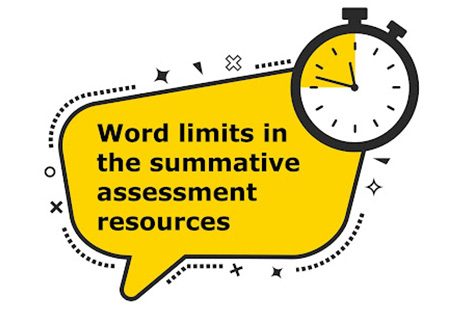One of the most important aspects of VET is summative assessment. Summative assessment resources play a vital role in ensuring that students are able to demonstrate their learning and progress. However, summative assessment resources can also be a source of frustration for both students and educators if they are not well managed and written. It is widely accepted that summative assessment resources in vocational education and training (VET) should have word limits. This is because having a word limit ensures that the focus is on the key learning outcomes and not on trivial matters. It also allows for a more efficient and effective assessment process, as well as ensuring that the results of the assessment are more reliable. It is a key element in ensuring that students have the opportunity to develop the necessary skills and knowledge to complete their qualification.
There are several reasons why it is important to have word limits in summative assessments.
It provides a level playing field for all students.
It allows trainers/assessors to focus on the quality of the work rather than the quantity. It ensures that students are able to focus on the key issues and provides a level playing field for all candidates. When students know they only have a certain number of words to write, they are more likely to focus on the most important information and leave out any superfluous details. This not only makes for a more concise and well-written essay, but also helps to ensure that the student is covering all of the key points required by the assessment task.
It helps to prevent plagiarism. When students are given a large amount of material to work with, they may be tempted to copy and paste sections from various sources in order to save time. However, if they know that they only have a limited number of words to use, they are more likely to take the time to paraphrase and reference properly. This not only benefits their own learning, but also helps to ensure the academic integrity of the assessment.
In addition, word limits can also help to ensure that students are not spending too much time on one particular section of the task. If students know they only have a limited amount of words to use, they are less likely to spend an excessive amount of time on one section and neglect other important parts of the task. This can often lead to poorer overall performance, as students who spend too much time on one section may find it difficult to move on to the next.
Then, setting word limits also allows educators to more easily identify which students need extra help or support. This is because students who struggle with writing often have difficulty meeting the required word limit.
Finally, they help to ensure that assessments are fair and objective. Word-limits ensures that the assessment process is more efficient and effective. This is because it is often difficult to assess large amounts of text. Having a word limit allows the assessor to read through the resources more quickly and identify the key points. This makes the assessment process more efficient and effective, as well as ensuring that the results are more reliable.
Word limits also help to ensure that assessments are manageable for both trainers/assessors. By setting a maximum word limit, it ensures that there is less material for trainers/assessors to mark and assess, making the process more efficient.
While word limits are important, it is also important to be realistic when setting them. It is unrealistic to expect students to write a perfect essay within the confines of a few hundred words, and doing so may actually lead to poorer performance. Instead, it is important to set a word limit that is achievable, but also challenging enough to ensure that students are still required to focus on the key points.
Ultimately, setting word limits is an important part of assessment in VET. By doing so, you can help to ensure that students focus on the key points, avoid plagiarism, and don’t spend too much time on one particular section. While it is important to be realistic when setting word limits, they can ultimately benefit both the student and the assessment process as a whole. Word-limits are there to ensure that the results of the assessment are more reliable. This is because if there is too much text, it can be difficult to identify any patterns or trends. Having a word limit means that there is less text to analyse, which makes it easier to identify any patterns or trends. This in turn makes the results of the assessment more reliable.
In conclusion, it is clear that there are several advantages to having word limits in summative assessment resources in VET. These advantages include the fact that it allows the assessor to focus on the key learning outcomes, makes the assessment process more efficient and effective, and helps to ensure that the results of the assessment are more reliable. As such, it is clear that summative assessment resources should have word limits.




